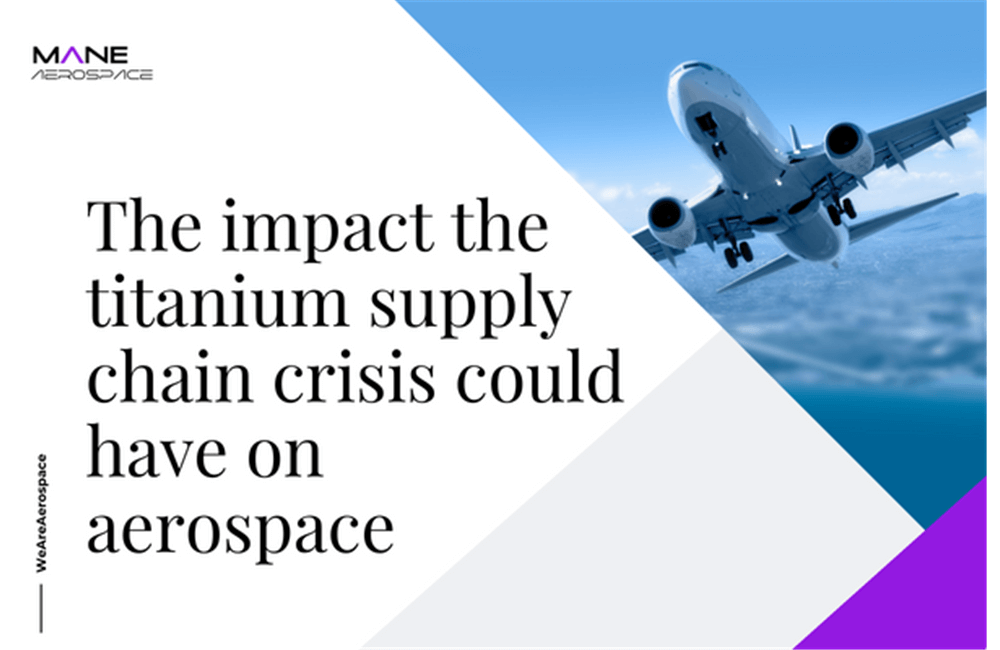The impact the titanium supply chain crisis could have on aerospace
15 Nov, 202210 minsCurrently, the aerospace industry is facing a shortage of titanium, following supply chain p...

Currently, the aerospace industry is facing a shortage of titanium, following supply chain problems. In light of Russia’s invasion of Ukraine, international sanctions were put on the country, and this has had a knock on effect elsewhere. So, what does this mean for aerospace?
There has always been a lot of discussion surrounding how far the European Union would go with imposing sanctions on Russia, as many experts believed that some sanctions would negatively impact the European economy. They wanted sanctions to be prepared, thought out and carefully planned. One organisation that has already begun to notice the impact is Airbus, the largest aerospace manufacturer in the world.
Airbus has expressed concerns about some of the sanctions placed on one specific Russian company called VSMPO-AVISMA, which produces titanium. VSMPO-AVISMA is run by the state of Russia, and many believe that sanctioning the company would damage the aerospace industry in Europe.
Guillaume Faury, CEO of Airbus, explained that sanctioning VSMPO-AVISMA would damage European aerospace without really impacting the Russian economy. This thought heightened further in June 2022, when a new package of sanctions was imposed on other Russian goods. However, in a surprising turn of events, VSMPO-AVISMA was later removed from the list of sanctions, meaning that Russian titanium could continue to be used in Europe.
Are Western Companies Too Reliant on Russian Titanium?
It’s hard to determine how much of Airbus’ titanium comes from Russia, but reports suggest that it’s around 65%. VSMPO-AVISMA is a part of Rostec, which is a state owned conglomerate in Russia, one that owns a lot of the country’s defence companies. Rostec is also responsible for the production of most of Russia’s titanium, which has made this reliance on Russian titanium seem questionable in light of current events in Ukraine. VSMPO-AVISMA has been working with the western aerospace industry since the early 2000s, and it has been Boeing’s main titanium supplier since 2006.
As US companies struggled to keep up with the cheaper titanium being imported from Russia, Russia’s titanium exports tripled. In 2021, the last titanium production facility in North America closed, putting an even bigger reliance on Russian imports.
Are Companies Trying to Move Away From Russia’s Titanium Supply?
Back in 2014, VSMPO-AVISMA provided 40% of Boeing’s titanium, 60% for Airbus’ titanium and 100% of Embraer’s titanium. When the Crimean crisis happened, little changed. Though companies said they would decrease their reliance on Russian exports, very little change was made. However, once Russia invaded Ukraine, things began to change.
Boeing has recently announced that it would no longer import titanium from Russia and, though Airbus has not yet done the same, the company has said that it’s looking for other suppliers in the event that other sanctions are implemented. This shows that western companies are attempting to move away from Russian titanium, and are planning to source it elsewhere.
This could be difficult to put into action, as the other two big players in the world of titanium production are China and Japan. But, thanks to partnerships with Airbus and Boeing, VSMPO-AVISMA rose through the ranks and became a key part of the market. The west could source titanium from China, but this would be putting reliance onto another country, making western companies dependent elsewhere.
Another option is to restart manufacturing titanium domestically in the US and Canada, which some companies have already begun doing.


